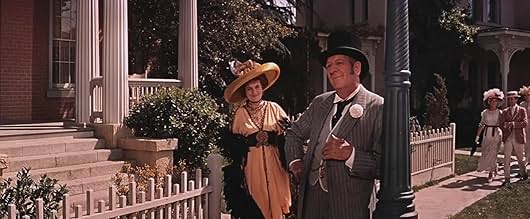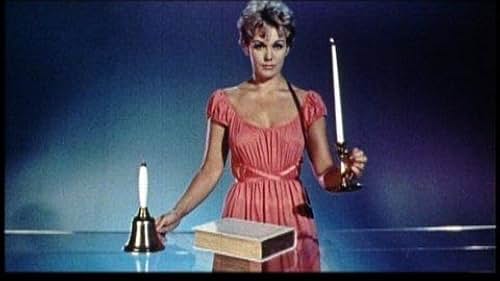Hermione Gingold(1897-1987)
- Actress
- Writer
- Soundtrack
One of stage, screen, radio and TV's most inimitable, irrepressible entertainers, Hermione Ferdinanda Gingold was born in London on December 9, 1897, the daughter of an upscale Austrian-Jewish financier and English homemaker. The blue-eyed blonde loved to perform in school plays and made her professional stage debut at age 11 as the Herald in "Pinkie and the Fairies."
She went on to appear at London's Savoy Theatre, at Christmastime in 1911, in the children's fantasy "Where the Raindow Ends," starring Reginald Owen and a cast of 45 children, including Gingold and a 12-year-old Noël Coward. Trained in the classics under actress/writer Rosina Filippi (1866-1930), Hermione played everything from the Page in "The Merry Wives of Windsor" to Jessica in "The Merchant of Venice" and Cassandra in "Troilus and Cressida." Stage parts in "Little Lord Fauntleroy" and "The Dippers" also came about during this period.
But it was Hermione's deep, guttural voice (as a result of vocal nodes) and flair for tart, quirky comedy that truly boosted her notoriety in the 1930's when she triumphed as a musical revue artist. Sharpening her talent and bawdy, razor-like wit in this venue throughout World War II, she graced such revues as "The Gate Revue," "Sweet and Low," "Sweet and Lower," "Sweet and Lowest," "Swinging the Gate" and "Rise Above It." In between she appeared in a few films, including a cleaning woman bit in the comedy thriller Someone at the Door (1936), and featured roles in the comedies Meet Mr. Penny (1938) and The Butler's Dilemma (1943).
After performances in such legit plays as "Fumed Oak" and "Fallen Angels" in 1949, and having completed character roles in the pictures The Pickwick Papers (1952), The Slasher (1953) and The Adventures of Sadie (1953), she transported herself to the States, making her New York bow with the popular revue "John Murray Anderson's Almanac," directed by Cyril Ritchard. She was an immediate success and went on to win the theatre's Donaldson Award for this performance. Settling now in America, she involved herself with a variety of theatre projects including "Sticks and Stones" (revue, 1956), "The Sleeping Prince (play) 1956), "Fallen Angels" (play, 1957-58), "First Impressions (play, 1959), "From A to Z (revue, 1960) and as Julia in "Abracadabra," (play, 1960), which she also wrote.
Beloved on Broadway, Hermione served as intriguing replacements for "Milk and Honey" (1962) and "Oh Dad, Poor Dad, Mama's Hung You in the Closet and I'm Feelin' So Sad" (1963) and continued to make a mark with such plays as "Charley's Aunt." In 1973, the 75-year-old veteran was a featured highlight nostalgically warbling the exotic tune "Liaisons" in the Stephen Sondheim musical hit "A Little Night Music" as Madame Armfeldt. She later returned to Sondheim with the tribute show "Side by Side by Sondheim" in 1978.
Never one to be overlooked for long, she was invited to Hollywood and made a delightfully offbeat niche for herself in several eccentric comedies and plush musical films. Usually permitted to play her charming and haughty self, she was Golden Globe awarded playing the aging courtesan in Gigi (1958) while singing the nostalgic duet "I Remember It Well" with equally aging playboy Maurice Chevalier. Other movie roles would include a quirky cameo as a witch queen in the comedy Bell Book and Candle (1958); another quirky cameo in the second-rate Hitchcockian thriller The Naked Edge (1961); a Golden Globe nominated part as the mayor's wife in the musical The Music Man (1962); a comically villainous voice in the animated musical feature Gay Purr-ee (1962) starring the vocal talents of Judy Garland; a charming reunion with Chevalier in the lightweight comedy I'd Rather Be Rich (1964); a bizarre landlady in the romantic comedy Promise Her Anything (1966), which reunited her with her "Gigi" star Leslie Caron; a devious British Munster relative in Munster, Go Home! (1966); and her Madame Armfeldt recreation in a rather pallid film version of her stage hit A Little Night Music (1977). Her last film was as an aging actress who rubbed elbows with Garbo in the comedy-drama Garbo Talks (1984) starring Anne Bancroft.
Gingold was a delightfully ribald raconteur and became a very popular TV talk show guest, particularly on The Tonight Show Starring Jack Paar (1957). She was finishing up the last touches on her autobiography when she passed away in New York City of pneumonia and a heart ailment on May 24, 1987. Her autobiography, How to Grow Old Disgracefully, was published a year after her death (1988). It had been previously presented in installments -- The World Is Square (1946), My Own Unaided Work (1952) and Sirens Should Be Seen and Not Heard (1963). A one-of-a-kind entertainer if ever there was one.
She went on to appear at London's Savoy Theatre, at Christmastime in 1911, in the children's fantasy "Where the Raindow Ends," starring Reginald Owen and a cast of 45 children, including Gingold and a 12-year-old Noël Coward. Trained in the classics under actress/writer Rosina Filippi (1866-1930), Hermione played everything from the Page in "The Merry Wives of Windsor" to Jessica in "The Merchant of Venice" and Cassandra in "Troilus and Cressida." Stage parts in "Little Lord Fauntleroy" and "The Dippers" also came about during this period.
But it was Hermione's deep, guttural voice (as a result of vocal nodes) and flair for tart, quirky comedy that truly boosted her notoriety in the 1930's when she triumphed as a musical revue artist. Sharpening her talent and bawdy, razor-like wit in this venue throughout World War II, she graced such revues as "The Gate Revue," "Sweet and Low," "Sweet and Lower," "Sweet and Lowest," "Swinging the Gate" and "Rise Above It." In between she appeared in a few films, including a cleaning woman bit in the comedy thriller Someone at the Door (1936), and featured roles in the comedies Meet Mr. Penny (1938) and The Butler's Dilemma (1943).
After performances in such legit plays as "Fumed Oak" and "Fallen Angels" in 1949, and having completed character roles in the pictures The Pickwick Papers (1952), The Slasher (1953) and The Adventures of Sadie (1953), she transported herself to the States, making her New York bow with the popular revue "John Murray Anderson's Almanac," directed by Cyril Ritchard. She was an immediate success and went on to win the theatre's Donaldson Award for this performance. Settling now in America, she involved herself with a variety of theatre projects including "Sticks and Stones" (revue, 1956), "The Sleeping Prince (play) 1956), "Fallen Angels" (play, 1957-58), "First Impressions (play, 1959), "From A to Z (revue, 1960) and as Julia in "Abracadabra," (play, 1960), which she also wrote.
Beloved on Broadway, Hermione served as intriguing replacements for "Milk and Honey" (1962) and "Oh Dad, Poor Dad, Mama's Hung You in the Closet and I'm Feelin' So Sad" (1963) and continued to make a mark with such plays as "Charley's Aunt." In 1973, the 75-year-old veteran was a featured highlight nostalgically warbling the exotic tune "Liaisons" in the Stephen Sondheim musical hit "A Little Night Music" as Madame Armfeldt. She later returned to Sondheim with the tribute show "Side by Side by Sondheim" in 1978.
Never one to be overlooked for long, she was invited to Hollywood and made a delightfully offbeat niche for herself in several eccentric comedies and plush musical films. Usually permitted to play her charming and haughty self, she was Golden Globe awarded playing the aging courtesan in Gigi (1958) while singing the nostalgic duet "I Remember It Well" with equally aging playboy Maurice Chevalier. Other movie roles would include a quirky cameo as a witch queen in the comedy Bell Book and Candle (1958); another quirky cameo in the second-rate Hitchcockian thriller The Naked Edge (1961); a Golden Globe nominated part as the mayor's wife in the musical The Music Man (1962); a comically villainous voice in the animated musical feature Gay Purr-ee (1962) starring the vocal talents of Judy Garland; a charming reunion with Chevalier in the lightweight comedy I'd Rather Be Rich (1964); a bizarre landlady in the romantic comedy Promise Her Anything (1966), which reunited her with her "Gigi" star Leslie Caron; a devious British Munster relative in Munster, Go Home! (1966); and her Madame Armfeldt recreation in a rather pallid film version of her stage hit A Little Night Music (1977). Her last film was as an aging actress who rubbed elbows with Garbo in the comedy-drama Garbo Talks (1984) starring Anne Bancroft.
Gingold was a delightfully ribald raconteur and became a very popular TV talk show guest, particularly on The Tonight Show Starring Jack Paar (1957). She was finishing up the last touches on her autobiography when she passed away in New York City of pneumonia and a heart ailment on May 24, 1987. Her autobiography, How to Grow Old Disgracefully, was published a year after her death (1988). It had been previously presented in installments -- The World Is Square (1946), My Own Unaided Work (1952) and Sirens Should Be Seen and Not Heard (1963). A one-of-a-kind entertainer if ever there was one.



































